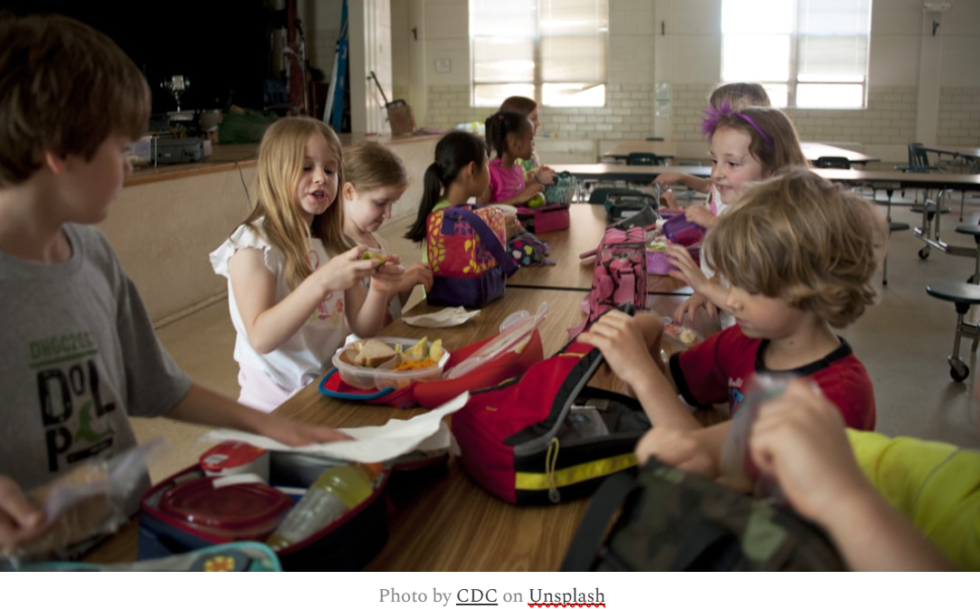
The school is now participating in the federal Community Eligibility Provision. All of Fredericksburg and Caroline schools, and some of Stafford and Spotsy schools already participate.
All enrolled students at King George Elementary School, including those enrolled in the county’s preschool programs, can receive free breakfast and lunch this year.
The school announced this week that it is now participating in the Community Eligibility Provision, a program of the U.S. Department of Agriculture Food and Nutrition Service that allows schools and school districts in low-income areas to serve meals at no cost to all enrolled students without collecting household applications.
Individual schools or entire school divisions in which at least 25% of enrolled students are eligible for free or reduced-price meals can implement the CEP.
The USDA this past fall expanded access to the CEP by reducing the eligibility requirement from 40% to 25% of enrolled students.
All King George County schools are now eligible for the program because of this change. According to the Virginia Department of Education’s annual report of CEP-eligible and near-eligible schools and school divisions, about 33% of all students in the division qualify for free or reduced-price meals.
King George Elementary—which is temporarily housing the county’s preschool programs—is the only division school participating in CEP this year. The eligible population at that school is just under 49%, according to the VDOE.
Locally, all Fredericksburg City and Caroline County schools are already enrolled in the CEP, as are some Stafford and Spotsylvania schools.
In Caroline, 46% of enrolled students are eligible for free or reduced-price meals, and in Fredericksburg, 52% of students are eligible, according to the Food Research and Action Center, which maintains a searchable database of eligibility and participation in the CEP.
The seven Stafford schools that participate—Anne E. Moncure, Falmouth, Kate Waller Barrett, Rocky Run and Widewater elementary schools and the North Star and Rising Star early childhood education centers—have an eligibility percentage of 48%.
The participating schools in Spotsylvania last year were Battlefield, Berkeley, Cedar Forest, Courthouse Road, Harrison Road, Lee Hill, Livingston, Parkside, Riverview, Salem, Smith Station, Spotswood, Spotsylvania, and Wilderness elementary schools; Battlefield, Freedom, Post Oak, Spotsylvania, Thornburg, and Chancellor middle schools; Chancellor, Massaponax, and Spotsylvania high schools; and the John J. Wright Center.
The eligible student population at these schools ranges from 40% to a high of 48% at Berkeley Elementary.
Spokeswoman Rene Daniels said the division expects to hear on Friday which schools are approved to participate in the CEP this year.
Fredericksburg City has participated in the CEP since 2015, when the preschool programs and Hugh Mercer Elementary joined, the division’s food service director Brian Kiernan said. Lafayette Elementary became eligible in 2017, Walker-Grant Middle in 2018, and James Monroe High School in 2020.
Kiernan said there are many benefits to participating in the CEP for both school divisions and families.
“Children have access to healthy meals each day at NO cost,” he said. “It eliminates the unnecessary paperwork required for Free or Reduced Meal eligibility, eliminates the stigma attached to families that are financially challenged, eliminates un-paid meal charges, and creates a better learning environment for children.”
For school divisions, Kiernan said that participating in the CEP can do the following:
- Reduce administrative staff time required to process meal applications and verifications
- Speed up meal service by removing the need to categorize meals as “free,” “reduced,” or “paid” at the point of service
- Increase meal participation and revenue without increasing labor costs, which allows school divisions to invest in healthier meal components or ingredients. (For example, Kiernan said, “FCPS increased their fresh fruits and vegetable purchases by 30% from 2022 to 2024.”)
- Increase revenue (if managed properly) and allow for investment into a broader line of menu items (vegetarian, vegan, gluten free, low-carb, halal) to better accommodate the needs of families
- Provide more consistent data to make budgeting for the future more simple
Caroline County schools adopted the CEP in 2022, and the number of meals the division has served annually has increased since then from 720,585 in 2021-22 to 911,836 last year.
Schools that adopt CEP are reimbursed by the USDA using a formula based on the percentage of identified students, according to the Food Resource and Action Center.
School nutrition departments operate financially independently of their school districts.





